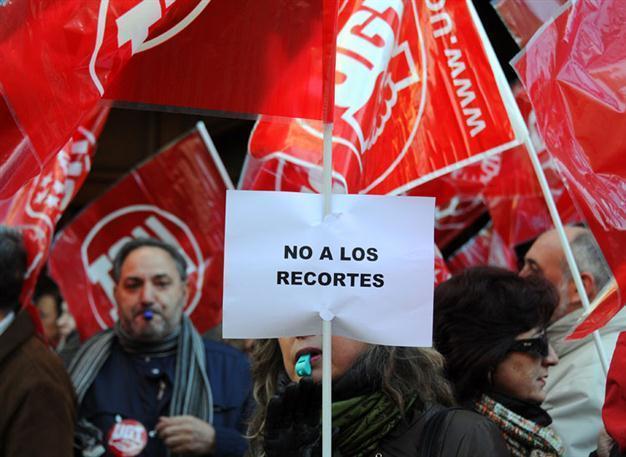Spanish economy shrinks, sliding into recession
MADRID - Agence France-Presse

A demonstrator holds a sign reading "No to Cuts" during a demonstration of public servants against the austerity measures of the Spanish government on Janaury 24, 2012 in Madrid. AFP photo
Spain's battered economy shrank by 0.3 percent in the final quarter of 2011, official data showed Monday, as it slid towards recession with a 23-percent jobless rate.The eurozone's fourth-biggest economy now faces a near-certain recession in 2012, the highest unemployment rate in the industrialized world, and the prospect of deep spending cuts to control a blown-out deficit.
Gross domestic product (GDP) in last quarter of 2011 dropped by 0.3 percent from the previous three months -- the first such decline since the end of 2009, the National Statistics Institute said.
The Spanish economy took a hit from weak domestic demand, which was only partially offset by a rise in exports, it said in a preliminary report based in some part on estimates.
Over the year as a whole, GDP rose just by 0.7 percent in 2011.
The year ahead looks bleaker.
The Bank of Spain last week predicted recession with a contraction of 1.5 percent in 2012, followed by 0.2 percent growth in 2013. The International Monteary Fund has forecast a deeper decline of 1.7 percent in 2012 and a further fall of 0.3 percent in 2013.
Spain emerged only at the start of 2010 from an 18-month recession triggered by a global financial crisis and a property bubble collapse that destroyed millions of jobs and left behind huge bad loans and debts.
The country's new right-leaning Popular Party government is struggling to slash a bloated public deficit and avoid being dragged back to the centre of a crisis of confidence in eurozone sovereign debt.
Prime Minister Mariano Rajoy plans 8.9 billion euros ($11.7 billion) in new budget cuts, tax increases to rake in 6.3 billion euros, and an anti-tax fraud campaign to recoup about 8.2 billion euros.
But worries are growing that cost-cutting alone will not suffice to cut the deficit.
A recession and higher jobless numbers make it harder to curb the deficit because the state must pay more in unemployment benefits while receiving less income from taxes.
Spain's jobless total rose 295,300 to 5.27 million people at the end of 2011, pushing the unemployment rate to 22.85 percent, the highest level among members of the Organisation for Economic Cooperation and Development.
Among young people aged 16-24, nearly half of the labour force -- 48.6 percent -- were out of work.
On Friday, Fitch Ratings downgraded the sovereign debt of of Spain and four other eurozone countries, citing their vulnerability to sharp turns in market sentiment in the eurozone debt crisis.
It cited in particular Spain's failure to meet its 2011 deficit-cutting target.
Rajoy has said the 2011 deficit will be about eight percent of GDP -- far beyond the 6.0-percent target -- but has promised to abide by Spain target of lowering the deficit to 4.4 percent of GDP in 2012 and 3.0 percent of GDP in 2013.
But Fitch said the 2012 and 2013 targets were now unrealistic.
"This material fiscal slippage primarily reflects an over-shoot at the regional government level and underscores a structural weakness in Spain's fiscal framework and has undermined the credibility of the fiscal consolidation programme," Fitch said in a report. "In Fitch's view, the official 2012 deficit target of 4.4 percent is now likely to prove unrealistic. The agency therefore assumes that this year's deficit will come in at 6 percent, and that the stated 3-percent target will now not be reached until 2014." The agency said economic re-balancing in Spain was hindered by a rigid labour market.
Spain's statistics institute will publish a final report on gross domestic product figures for the fourth quarter of 2011 on February 16.
















